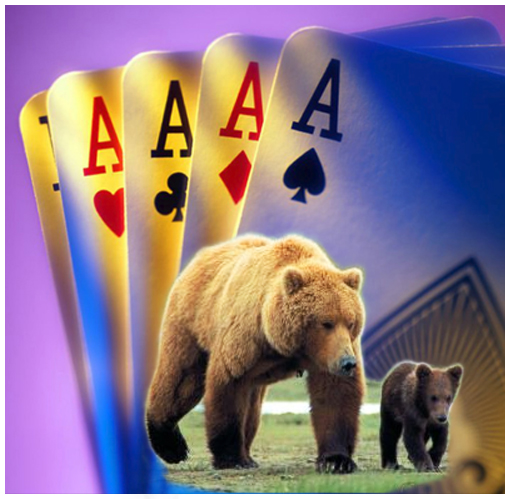Parts: One — Two — Three — Four — Five — Six — Seven — Eight
We won’t find any advantages here. Pity poor Man, all domesticated and dumbed down so that his wild senses, if ever he had any good ones, are now blunted and tamed.
All the other animals, with their razor-sharp sensory gifts beat us all to hell in this area. Even without the ever-present threat of slinking, silent predators, we seem barely well enough equipped to keep from poisoning ourselves with dangerous plants, bad water or tainted meat.
Yet …
We can hear well enough to pick out the individual notes of a single instrument, whether in a soothing symphony or a raging rock song. Could that same inborn talent be used in the primitive wilds to detect the sounds of predators or prey, perhaps even against a noisy jungle background?
We can taste and smell well enough, some of us – which means the ability is innate in the human animal – to tell the difference between consecutive years of the exact same wine. Is that ability the sophisticated remnant of senses formerly tuned to the detecting of edible plants, of drinkable water, or even the safety of scavenged meat?
Whatever the answer, somehow – in a time when dangerous predators ruled the earth – somehow the little human nebbish seems to have squeaked by. Even with his flat nose and his little wrinkled immobile ears, he made it here to this safe modern time.
Vision
Again, poor little Man. Against the legendary visual gifts of the hawk or the eagle, compare the dim human vision of our species. We struggle myopically in the wildlands, stumbling along a well-marked trail while all around us animals spy on us, marking our clumsy progress with amusement.
Well, at least give points for our ability to see color, which is not universal among our four-legged compeers. Say a few good words about our forward-aimed binocular vision that gives a pretty fair measure of depth and distance in our environment. And though we can’t match the night sight of specifically nocturnal animals, our eyes do adapt relatively quickly to low light levels, allowing us to function with some confidence on any clear night. Plus, our eyes rest fairly high on our spindly upright frame, giving us a distance advantage, sight-wise, on those with eyes closer to the earth.
Size and Strength
Any schoolchild can name animals larger than humans: whales, lions, elephants, bears, rhinos. Size could certainly not be much of an advantage for humans. It would have to be said to weigh somewhat heavily against man’s continued survival, wouldn’t you think?
Unless, that is, you call the roll of ALL the animals on earth, and discover that humans are actually well up in the top one percent. We are, in fact, fairly large creatures.
Maybe this does nothing, however, but make us just that much bigger a chunk of meat on some predator’s table.
Longevity
Compared to most other animals, we live a really long time. Science writer Isaac Asimov once penned an essay about man’s longevity. He compared the lifespans of various animals by the total number of heartbeats in an average specimen’s lifetime. Whether mice or dogs or deer, most mammals seem to live about a billion heartbeats long. Yet at 60 beats per minute (my own heart rate is usually higher than that) a 70-year-old human has lived more than two billion.
Big deal. Tortoises live a long time with their own slow-beating hearts — but in human terms it doesn’t seem to do them much good. Other than the ability to think dull reptile thoughts for even longer periods of time, can longevity make any real difference?
Well, admittedly, we fragile humans have the ability to learn about our environment, and to pass along that knowledge to others of our tribe. Living in mutually-supporting tribal groups as we have for most of our history, maybe a learned elder, there to teach and help care for youngsters, would provide enough of an advantage to his small tribe that they were able to stave off extinction by a tiny margin each time. Generations of such elders, passing along hard-won knowledge, might add even a tad bit more to the survival side of the scale.
Add in that part of our longevity is a period of fertility measured in decades – three-plus on the female side, to a conceivable six for the male.
Yet could either of these be “Man’s special something,” the whatever-it-is that kept us alive this long? It’s not enough, is it?
Endurance
We have the capacity for remarkable endurance. Line up all the land animals on earth for a marathon footrace, and very few would be able to make it past the first few miles. Wolves and horses and a few other critters would be there at the finish line, and not many others. But Man would be.
Advantage?
Well, yes. Endurance works at any speed – humans don’t have to be running to benefit from greater endurance. In pursuing prey, getting out of range of predators, escaping fire, moving away from diminished hunting range, or many other situations that can be imagined – just sitting down and working for hours and hours each day, for instance, something no other predator does – it would have to be considered an advantage.
Okay, we can grudgingly admit to a second small advantage.
But aren’t there at least a few really big ones?
— CONTINUED —
Parts: One — Two — Three — Four — Five — Six — Seven — Eight


